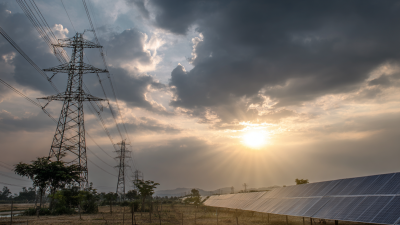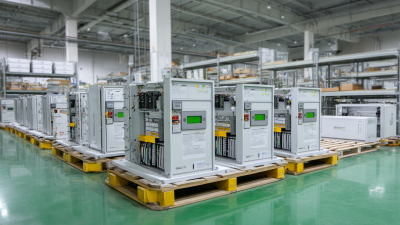SunVena Solar Blog
Residential Solar News, Insights & Resources
Innovative Examples of RV Solar Inverter Technologies Shaping Sustainable Travel
As the demand for sustainable travel continues to rise, innovative technologies in the RV sector have played a crucial role in shaping environmentally friendly journeys. Among these advancements, the RV solar inverter stands out as a transformative component that allows travelers to harness solar energy for their power needs. According to a report by the Solar Energy Industries Association, the RV solar market has experienced a significant growth of over 30% annually, driven by increasing consumer awareness and the benefits of renewable energy.
 By integrating rv solar inverters, travelers can reduce their carbon footprint, decrease reliance on fossil fuels, and enjoy the freedom of off-grid camping. This blog will explore the various problems associated with traditional inverter types and how cutting-edge solar inverter technologies are paving the way for a greener future in RV travel.
By integrating rv solar inverters, travelers can reduce their carbon footprint, decrease reliance on fossil fuels, and enjoy the freedom of off-grid camping. This blog will explore the various problems associated with traditional inverter types and how cutting-edge solar inverter technologies are paving the way for a greener future in RV travel.
Overview of RV Solar Inverter Technologies Revolutionizing Sustainable Travel
As the demand for eco-friendly travel options rises, RV solar inverter technologies are stepping into the spotlight, revolutionizing how we experience the great outdoors. These innovative systems allow travelers to harness solar energy, powering everything from appliances to climate control systems, thus reducing reliance on fossil fuels and minimizing carbon footprints. RV solar inverters convert the direct current (DC) from solar panels into alternating current (AC), making it possible to run standard electrical devices while on the road.
When considering RV solar inverter systems, start by assessing your energy needs. Calculate the total wattage of devices you plan to use and ensure your inverter can handle that load. Additionally, invest in quality solar panels that maximize sunlight absorption. Proper placement and regular maintenance can significantly improve efficiency, ensuring you get the most out of your system.
Another key tip is to explore hybrid systems that combine solar with traditional generators. This flexibility allows RV owners to remain powered up during prolonged trips or in areas with limited sunlight. Embracing these advanced inverter technologies not only promotes sustainable travel but also enhances the overall adventure, allowing for extended off-grid experiences with peace of mind.
Benefits of Implementing Solar Inverters in RVs for Eco-Friendly Journeys
The increasing integration of solar inverters in recreational vehicles (RVs) is transforming the landscape of eco-friendly travel. According to a report by Allied Market Research, the global market for solar inverters is projected to reach $10.9 billion by 2027, reflecting a growing trend among RV owners to seek sustainable energy solutions. By harnessing solar power, RV travelers can significantly reduce their reliance on fossil fuels, leading to lower carbon emissions and a smaller ecological footprint during their adventures.
Implementing solar inverters in RVs offers numerous benefits. For one, they provide a reliable and renewable energy source that enables users to power essential appliances, lighting, and even electric vehicles while on the road. Data from the National Renewable Energy Laboratory indicates that a properly sized solar power system can reduce the need for generator use by up to 90%. This not only contributes to a quieter, more serene camping experience but also allows travelers to explore remote areas without the constraints of traditional power sources. As sustainable travel becomes a priority for many, solar inverters are poised to be a game-changer in promoting eco-friendly journeys for all RV enthusiasts.
Innovative Examples of RV Solar Inverter Technologies Shaping Sustainable Travel
| Technology | Efficiency (%) | Weight (lbs) | Cost ($) | Warranty (years) | Eco-Friendly Benefits |
|---|---|---|---|---|---|
| Pure Sine Wave Inverter | 90-95 | 20 | 800 | 5 | Reduces load on generator; Silent operation |
| Grid Tie Inverter | 95-98 | 15 | 1,200 | 10 | Sends excess power to grid; lowers electricity costs |
| Modified Sine Wave Inverter | 80-85 | 25 | 600 | 3 | Lower cost; suitable for basic appliances |
| Portable Solar Inverter | 85-90 | 10 | 500 | 2 | Great for camping; reduces reliance on fossil fuels |
Comparative Analysis of Leading Brands in RV Solar Inverter Solutions
As the RV market continues to grow, solar inverter technologies have become essential for travelers seeking sustainable adventures. A comparative analysis of leading brands reveals distinct advantages depending on user needs. For instance, brands like Victron Energy and Renogy stand out for their efficiency and reliability. Victron's inverter technology offers advanced monitoring capabilities, allowing users to optimize energy use in real-time, while Renogy's products are often praised for their affordability and user-friendly features.
When choosing an RV solar inverter, consider the power requirements of your devices. Ensure your chosen inverter can support your peak usage to avoid any downtime. Another tip is to evaluate the system's ease of installation; some brands offer plug-and-play options that simplify the process for users lacking technical expertise.
Additionally, it’s important to assess the warranty and customer support offered by these brands. A solid warranty can provide peace of mind, especially when investing in high-ticket items like solar inverters. Leading brands typically offer extensive support, helping travelers maintain their systems effectively and ensuring a seamless experience on the road.
Innovative RV Solar Inverter Technologies - Comparative Analysis
Case Studies: Successful Integration of Solar Inverters in RV Travel Experiences
The integration of solar inverters into RV travel experiences has transformed how adventurers manage power consumption on the road. A recent report by the RV Industry Association (RVIA) highlights that around 30% of RV owners now utilize some form of solar power, reflecting a growing trend towards sustainable travel. One notable case is a family who retrofitted their RV with a solar inverter, allowing them to travel off-grid for weeks. By harnessing solar energy, they significantly reduced their reliance on traditional power sources, enabling a more eco-friendly travel lifestyle.
When considering solar inverter technology for your RV, it’s essential to assess your energy needs. For instance, most RVs consume between 300 to 2,000 watts depending on appliances in use. Investing in a solar inverter with an efficient MPPT (Maximum Power Point Tracking) controller can optimize power generation, especially on cloudy days.
Tips:
- Start with a solar kit that includes panels, batteries, and inverters to ensure compatibility and ease of installation.
- Regularly maintain your solar system by cleaning the panels and checking connections to maximize efficiency.

Future Trends in RV Solar Inverter Technologies and Their Impact on Adventure Tourism
As adventure tourism continues to gain popularity, the role of RV solar inverter technologies is becoming increasingly significant. These innovations enable RV enthusiasts to harness solar energy efficiently, allowing for longer off-grid trips without the reliance on traditional fuel sources. Future trends indicate a shift towards more integrated systems that seamlessly combine solar panels with advanced battery storage, enabling travelers to maximize their energy use while minimizing their ecological footprint. With lighter and more efficient inverters on the horizon, the potential for sustainable travel is expanding rapidly.
For those looking to embrace this trend, here are a few tips: first, invest in a high-efficiency solar inverter that suits your power needs, ensuring compatibility with your existing solar panel setup. Second, consider utilizing smart solar management systems that can monitor energy usage in real-time, enabling you to optimize your energy consumption. Lastly, staying informed about the latest innovations can help you make savvy upgrades to your RV, enhancing your overall travel experience while promoting sustainability in adventure tourism.

Related Posts
-

Mastering Your Solar System with the Best Must Solar Inverter Selection Guide
-

Navigating Import and Export Certifications for Best on Grid Solar Inverters in the Global Market
-

Mastering Hybrid Solar Inverters: A Comprehensive Guide to Boosting Energy Efficiency by 30%
-

Unlocking Energy Independence with Solar Power Inverter for Home Benefits